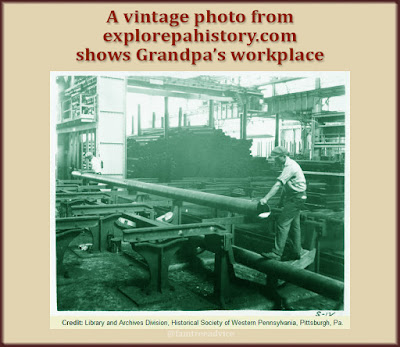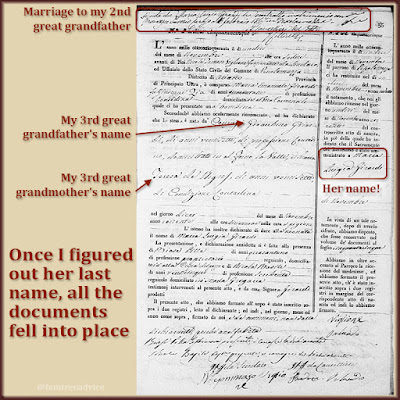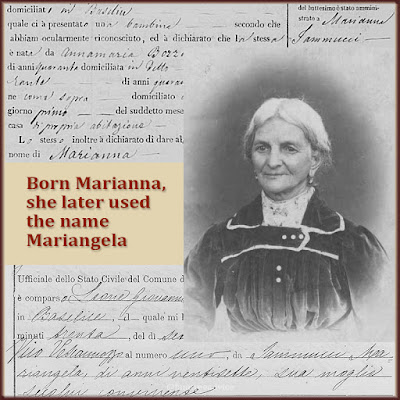Next time you complain about work, think about your hard-working ancestor.
Do you know where your ancestor worked? You may know their occupation. You can find that on a census sheet or ship manifest.
But do you know exactly where they worked? What was the name of the company? What did the company do? What did your ancestor do for them?
 |
| A search for the place where Grandpa worked delivered photos of the factory floor. |
Start by taking another look at their draft registration card. In the USA, men were registered during World War I and World War II even if they were to old to fight "over there". These draft registration cards can be a treasure trove. You will learn:
- their exact birth date
- their home address on the registration date
- the name of their nearest relative (often a wife or mother)
- their physical description
- what their signature looked like
You may learn:
- The town where they were born
- The name of their occupation
- The name and address of the place where they worked
If your ancestor was a farmer, you may find the address of the farm. If they worked in a factory, you may find the name and address of the company. You can Google the company and try to learn something about your ancestor's workplace.
I was looking at my grandfather's cousin Giovanni's draft registration card. I discovered he worked at the same company as my Grandpa.
 |
| Grandpa's cousin was always a step or two ahead. His draft card gave me an important clue. |
Giovanni was 9 years older than Grandpa. He came to America twice before Grandpa made his one and only trip to America in 1920. Like Grandpa, Giovanni traveled from southern Italy to Cherbourg, France, to get on a ship. Giovanni's 2nd trip to the U.S. was only one month before Grandpa's voyage.
Giovanni went straight to Pennsylvania where he worked for the National Tube Company.
Grandpa came to America a single man. His first stop was in the Bronx, New York, where his Uncle Giuseppe lived. He went north almost immediately to Newton, Massachusetts, where his Uncle Antonio lived. He worked at a bakery shop.
I'll never know why he didn't stay in the Boston area. Maybe the money wasn't very good. Whatever the reason, Grandpa followed Giovanni to work for the National Tube Company.
On 28 Jan 1924, Giovanni filed his petition for naturalization. Grandpa did the same 12 days later. Giovanni became a citizen on 19 Oct 1926. Grandpa's citizenship came through 4 months later.
Grandpa's year of birth dropped him into a sweet spot. He wasn't in America (or old enough) for the World War I draft. And he was too young to be included in the World War II "old man's registration". So there is no draft registration card for him.
Cousin Giovanni's card tells me that National Tube Company was on First Street in Ellwood City, Pennsylvania. So I Googled it to learn about the place where my relatives worked.
I had no clear idea what a tube was. But a photo taken shortly before Grandpa worked at the factory makes it clear. A steel tube is a pipe (duh). A long, seamless pipe. They used pipes in the oil industry or waterworks.
 |
| The company where Grandpa worked is gone, but the factory still stands. |
After working in this factory, Grandpa went to Youngstown, Ohio. He moved into the home of his father's 2nd cousin and soon married his landlord's daughter Lucy. She was his 3rd cousin, and my grandmother.
In Ohio Grandpa worked for the Carnegie Steel Company and then the railroad. He became sick and tired of the filthy work. The story in the family is that Grandpa said his job "stinks on the ice."
A few years later he moved his young family to the Bronx. They stayed with his Uncle Giuseppe until Grandpa got a job and an apartment. For the rest of his working life, Grandpa was a stone setter for a jewelry manufacturer.
Imagine how much easier it was! Setting stones at a workbench instead of whatever he was doing in the steel mills and railroad.
And that's the point. Thanks to a little research, I can imagine what his days were like in the National Tube Company. It sure adds a new dimension to the "stinks on the ice" story.
What documents have you found with the name and address of your ancestor's job? Have you researched the company yet?
And speaking of draft registration cards:










